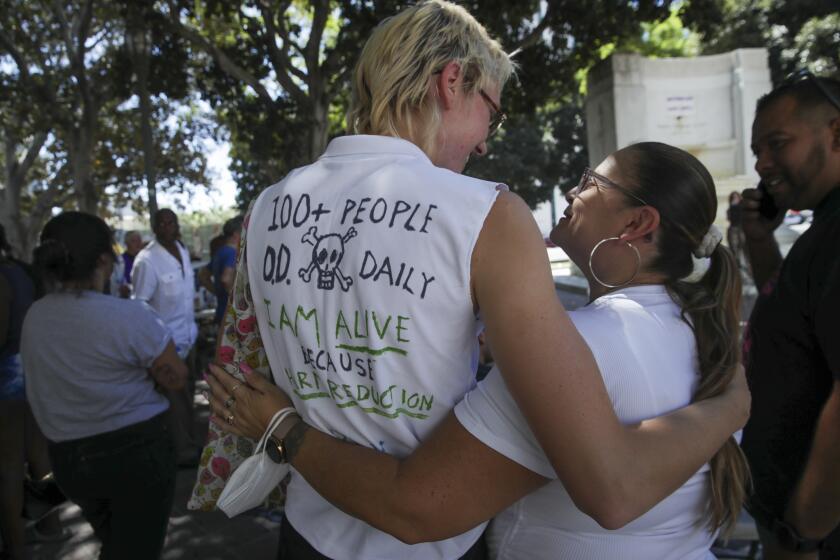Researchers in Child-Care Study Clash Over Findings
A week after a high-profile study cast a negative light on child care, researchers--including the study’s lead statistician--are sharply questioning whether their controversial work has been misrepresented.
As reported last week, the study showed that the more time preschoolers spend in child care, the more likely their teachers were to report behavior problems such as aggression and defiance in kindergarten.
But several academics involved in the study said that its conclusion was overstated and that other important findings never reached the public. In the aftermath, a rift has been exposed among the research team, and questions from other experts have caused the researchers to perform additional analysis before formally publishing their findings.
“I feel we have been extremely irresponsible, and I’m very sorry the results have been presented in this way,” said Margaret Burchinal, the lead statistician on the study, funded by National Institute of Child Health and Human Development. “I’m afraid we have scared parents, especially since most parents in this country [have to work].”
Several of those involved in the project accuse Jay Belsky, a professor at the University of London and one of the lead researchers on the study, of downplaying other important information when he presented the findings at a news conference last week. They accuse him of having an anti-child-care agenda.
Belsky charged that his colleagues are “running from this data like a nuclear bomb went off” because they are committed to putting an approving stamp on child care.
“I sometimes feel I’m in the old Soviet Union, where only certain facts are allowed to be facts, and only certain news is allowed to be news,” he said. “I’ve yet to hear a compelling argument that’s evenhandedly applied to all our data.”
Within academia, the dispute is part of a years-long battle between Belsky and his colleagues over whether child care harms children. For the public, the high-profile dispute illustrates how difficult it can be to separate ideology from objective findings, particularly on a topic as volatile as child care.
“The bottom line is this isn’t a simple story,” said Harvard researcher Kathleen McCartney, one of the investigators on the study.
The findings predictably sent parents into a tizzy, with many working parents worrying about or hotly defending their choices, and stay-at-home moms feeling vindicated.
But several researchers on the team said that if the public had been told other information about the study, the reaction might have been quite different. For example:
* Although 17% of kindergartners who had been in child care showed more assertive and aggressive behaviors, that proportion is the norm for the general population of children and adolescents. (Only 9% of children who spent most of their time with their mothers were rated by teachers as showing the more troubling behaviors.)
* Family interactions had a greater correlation with children’s future behavior than hours spent in child care.
* In addition, researchers said that the statistics are very modest: Few children exhibited above-average behavior problems, and the problems were not drastic.
Some parents whose children are subjects in the ongoing study have expressed concern and anger over the latest controversy. Investigators are worried that it may cause some families to drop out, and might jeopardize their chances of having funding renewed in 2004, said Alison Clarke-Stewart, a researcher at UC Irvine.
The massive research project, widely considered the largest and most authoritative of its kind in the nation, started 10 years ago with investigators going from room to room down hospital corridors asking new mothers if they would participate in a study of child development. More than 1,000 of the original subjects in 10 cities are still signed up, and investigators have followed the children ever since.
The investigators visit with their parents, giving them personality tests and checklists to fill out. They spend hours observing classrooms and day-care centers, talking with teachers and day-care providers. And then they use complex statistical analysis to figure out what it all means.
Data from the early years of the study--which has cost the federal government $80 million so far--is available to the public, and all the data eventually will be made available.
The most recent findings were presented at a conference last week of the Society for Research and Child Development in Minneapolis. But because the work has not yet been published, it has also not yet been formally critiqued by other experts.
Even though he has been philosophically at odds with the research team all along, it was Belsky, along with another researcher, Sarah Friedman, who wound up on a conference call with reporters last week to talk about the findings. At that conference, Belsky suggested that the findings meant that parents should consider cutting back on the number of hours they put their children in child care.
Other researchers were appalled.
A parent from Southern California participating in the study called Rush Limbaugh’s radio show to complain that researchers had not warned her of the dangers of child care. And investigators are now drafting a letter to go to all parents to calm their fears, said Clarke-Stewart.
Researchers also decided to hold off on publishing their findings because they want to perform more analysis, Clarke-Stewart said. They want to compare, for example, how many of the children who were rated as aggressive by their kindergarten teachers were also found by their mothers and child-care providers to be acting up. And they want to compare researchers’ own observations to those of teachers.
“There’s no question that the numbers are reliable,” Clarke-Stewart said. “But their meaning is something that requires a lot of thought.”
They also want to further investigate another study finding: that children who were in high-quality child-care centers were academically more advanced than their peers. Perhaps, researchers said, it is the more academically advanced children who are more aggressive; perhaps they are more bored or confident or rambunctious because they are used to school.
Clarke-Stewart said she believes it’s very possible that the differences between the two groups of children disappear by third grade, often a leveling-out year in child development.
Above all, the researchers said, they need to perform more analysis because they don’t know what the numbers mean.
In fact, disagreements over data are far from rare in the social sciences, said Elizabeth Loftus, a University of Washington psychologist. That is especially so in “hot potato” areas such as child care and repressed memories, her own highly controversial area of research.
Some studies by their nature can leave more room for interpretation based on ideology, scientists say.
Belsky said that if his team’s child-care research results had been favorable to day care, his colleagues would not be seeking further analysis.
“They’re so busy trying to protect mothers from feeling guilty, they’ve lost track of the science,” he said by phone from his office in London.
He agreed that the link between child care and aggression, while statistically significant, was not major. But he added that it was as significant as the finding that high quality child care was associated with better academic performance.
“One set of findings gets emblazoned, and the other gets censored,” he said.
Clarke-Stewart, who as a single working mother in the early 1980s placed her own son in child care, said researchers do not have an agenda.
“If I have an agenda, it’s a scientific one, not a political one,” she said. “When you come out with a finding that is negative and scary, you want to make sure you’ve done every possible analysis.”
*
Times staff writer Rosie Mestel contributed to this story.



